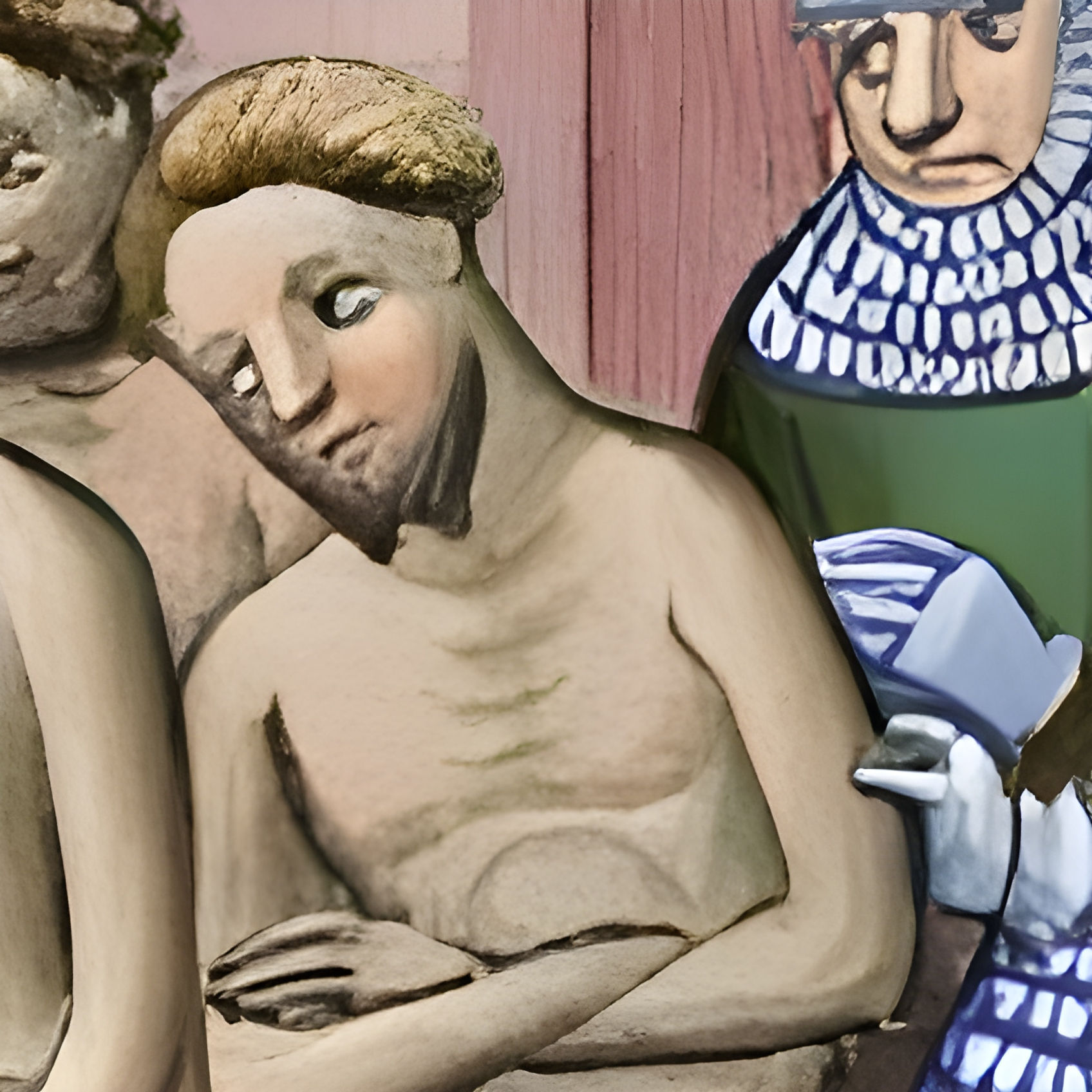This is something I never really understood in itself or why it’s important in the first place. Modern day examples would definitely help.
Can somebody help me out?
It’s treating commodities as things, not as relations, and forgetting that humans make commodities.
For example, it’s easy to look at a book and see a block of paper with writing on each sheet, all glued together. If it’s a signed book, it might fetch a higher price than one that isn’t signed. If it’s brand new, it might fetch a higher price than a second hand copy. The commodity – here, the book – is treated as a thing. This isn’t ‘wrong’; but it’s one-sided.
At the same time, the book is all the people who put it together: the writer, the printer, the binder. And all these can only be achieved if other workers have built a building, a printer, a laptop/typewriter, roads and vehicles to transport the equipment, materials, and the final product. Every one of the workers in these processes had to eat food every day (grown by farmers, prepared, packaged, cooked, etc), had to be raised and educated, etc. In reality, then, the book is a combination of all the relations between all the people who were needed to turn an idea into a book and get that book into shops and to each reader.
When commodities like books are fetishized, they’re treated as things and all the human relations are ignored. This was hard to do before modern capitalism, because many fewer people were involved in creating goods. As you knew who was involved in making e.g. a book (a small guild of craftspersons), it was harder to forget that the only reason the book existed was because of labour.
Under capitalism, labour is divided into so many parts, that very few people in the production process know anyone else. One person chops trees with a chainsaw. Another turns trees into pulp with a machine. Another turns pulp into sheets with another machine. Another cuts sheets into pages with a guillotine. Another makes chainsaws. Another gears, oil, chains. Another machines. Another guillotines. Another turns chemicals into ink. Etc, etc.
None of these people know each other personally. They only know each other as the commodities they produce.
When we go to the shop to buy paper, a book, ink, or anything else, we ‘meet’ all the people who have produced those goods but we only see the commodity, not those people. We come to fetishize commodities, hold them up as things that appear in shop shelves as if by magic.
If we want to solve a problem, we look for commodities as the solution. Hungry? Buy a sandwich. Thirsty? Buy a drink. Fancy a story? Buy a book. Cold? Buy a coat or a house or a heater. We are working together to meet each others needs but we do it by buying commodities. So the commodities take on some magical properties.
As money is used to buy any commodity, we eventually come to fetishize (worship) money as having unique magical properties. With money, one can buy anything they want or need. It can fix every problem. Or so it seems when commodities are fetishized. But it’s human labour, human relations – society – that produces the goods (and services) that satisfy our needs and wants, that solves our problems.
Commodity fetishism turns relations into things and separates humans from one another by making it appear that we don’t need each other to survive. This has loads of distorting and disturbing effects by encouraging us to be anti-social.
It’s human labour that produces what we need to survive. When we fetishize commodities, we come to think that it’s the commodities that keep us alive, not the human labour that produced those commodities.
Neoliberal economists boast about this with supply chain abstraction through I, Pencil, a work by Leonard Read then adopted by Milton Friedman.
Search ‘Nobody knows how to make a pencil’ and you’ll get thousands more hits than searching for commodity fetishism, Friedman basically repackaged Marx and sold it as a positive of free market economics.
They basically took commodity fetishism and fetishised it.
I’m fascinated and revulsed and unsurprised.
I’ll take a look at that essay, thanks.
I don’t believe this is the correct answer. Commodity fetishism is the fetishization of the commodity form, not of individual commodities. It’s the phenomenon of commoditizing everything from sex with your partner to pictures of your cat to 5 minutes as a passenger in a car just to experience the g-forces of racing. It’s the phenomenon of putting a dollar sign on everything and inventing all new ways of putting dollar signs on things.
I’m not sure that we disagree. But how else do you ELI5 without concrete examples?
You seem to be adding further concrete examples to explain it? Could I not abstract upwards and say it’s not those commodified experiences but the commodity form? I realise I chose physical goods and you chose ‘experiences’ (services?) but I think it’s a false dichotomy to separate them.
I don’t think the commodity form is more similar to ‘intangible’ commodities than to ‘tangible’ commodities just because they share in common the feature that ‘intangible’ commodities and the commodity form cannot be touched. But maybe I’ve misunderstood your criticism.
Your examples seem to support what I said: in other words, commodification is the reification of the commodity form. That form is an abstraction of individual commodities and it is relational, as is every subject to dialectical materialists. So this fetishization is the thingifying of human relations; or, it’s when humans turn (commodity) relations into things.
I appreciate the challenge and I’m not replying in this way to shut down the conversation. I think there is something in the distinction between commodities and the commodity form. I’m going to look into it to see if I have made an error.
Thanks for engaging. It’s definitely not something I am super firm on. I think the concrete examples you gave and I gave are pointing to different things. Maybe I was not clear on the distinction I was trying to make.
The way I interpret your examples is that we see the book in its idealist form, not its material form. That is to say, we see the brand, the status, the convenience, the desire, but not the object and all its relationships.
What I was trying to convey is that we interpret all of life through the lens of commodification. So when I see a beautiful tree, I think “how can I make money on this” and suddenly something that wasn’t a commodity becomes a commodity. We do this over and over. In the 1800s, some human activities that we now think of as jobs were not yet commodities, they were just things people did. But, through commodification of labor, commodity fetishism set in and more activities that were not commodifird became commodified. So, people used to make dolls for their kids, or read them bedtime stories, and now those have been commodified by someone fetishizing the commodity form and trying to apply it to things they see in the world.
Perhaps that is what you were trying to explain as well, and I didn’t interpret your words as you intended. But my initial read of your words does not match what I was trying to convey with mine.
Short read: https://redsails.org/commodity-fetishism/
Commodity fetishism describes the objective fact that in capitalism we don’t generally relate to each other as humans asking each other to do things, but rather indirectly command each other through commodities. If I go to a restaurant, I don’t beg the cook to make me a meal and the waiter to deliver it, nor do I imperiously threaten them with violence, nor do I cajole them into it. I just buy the meal. The meal itself then appears to command them to move, like a little god! And I in turn must similarly follow the commands of commodities in order to acquire the money to purchase such meals. This is how the factory comes to want to be used, and how the tropical fruit comes to want to find its way to Stockholm.
This is it.
Said more simply, commodity fetishism is the name of the phenomenon of people turning literally everything into a commodity for sale. Twitch streamers streaming themselves playing video games is an example. Jars of farts and used underwear are examples.
I think the word choice is easy to misunderstand. It’s essentially the fetishization of the commodity form, not the fetishization of individual commodities.
It’s that phenomenon of your mom saying “you’re so good at that, maybe you could sell it”, or of deciding your sex partner is so hot you should make money selling sex tapes, or of thinking your cat is so cute that you could probably monetize it.
I found Wallace Shawn’s explanation of Commodity Fetishism to be very enlightening.
Resharing below under the spoiler tag
"About a year ago I spent a day at a nude beach with a group of people I didn’t know that well. Lying out there, naked, in the sun, there was a man who kept talking about “the ruling class,” “the elite,” “the rich.” All day long, “The rich are pigs, they are all pigs, some day those pigs will get what they deserve,” and things like that. He was a thin man with a large mustache, unhealthy-looking but very handsome, a chain-smoker. As he talked, he would laugh—sort of bitter barks that came out always unexpectedly. I’d heard about these words and these phrases all my life, but I’d never met anyone who actually used them. I thought it was quite entertaining. But for about a month afterward a strange thing happened. Everywhere I went I started getting into conversations with people I met—on a train, on a bus, at parties, in the line for a movie—and everyone I met was talking like him: The rich are pigs, their day will come, they’re all pigs, and on and on. I started to think that maybe I was crazy. I thought I was insane. Could this really be happening? Was everyone now a Communist but me?
"And this was all happening at the very same time that Communism had finally died, and social pathologists were arguing over what had caused its death. The newspapers and magazines reported no nostalgia for the defunct system, and it seemed as if all the intellectuals and political leaders who had ever been known to have fallen under its sway were running in all directions looking for shelter. So then who were all these people who kept grabbing hold of me?
"One day there was an anonymous present sitting on my doorstep—Volume One of Capital by Karl Marx, in a brown paper bag. A joke? Serious? And who had sent it? I never found out. Late that night, naked in bed, I leafed through it. The beginning was impenetrable, I couldn’t understand it, but when I came to the part about the lives of the workers—the coal miners, the child laborers—I could feel myself suddenly breathing more slowly. How angry he was. Page after page. Then I turned back to an earlier section, and I came to a phrase that I’d heard before, a strange, upsetting, sort of ugly phrase: this was the section on “commodity fetishism,” “the fetishism of commodities.” I wanted to understand that weird-sounding phrase, but I could tell that, to understand it, your whole life would probably have to change.
"His explanation was very elusive. He used the example that people say, “Twenty yards of linen are worth two pounds.” People say that about every thing that it has a certain value. This is worth that. This coat, this sweater, this cup of coffee: each thing worth some quantity of money, or some number of other things—one coat, worth three sweaters, or so much money—as if that coat, suddenly appearing on the earth, contained somewhere inside itself an amount of value, like an inner soul, as if the coat were a fetish, a physical object that contains a living spirit. But what really determines the value of a coat? The coat’s price comes from its history, the history of all the people involved in making it and selling it and all the particular relationships they had. And if we buy the coat, we, too, form relationships with all those people, and yet we hide those relationships from our own awareness by pretending we live in a world where coats have no history but just fall down from heaven with prices marked inside. “I like this coat,” we say, “It’s not expensive,” as if that were a fact about the coat and not the end of a story about all the people who made it and sold it, “I like the pictures in this magazine.”
"A naked woman leans over a fence. A man buys a magazine and stares at her picture. The destinies of these two are linked. The man has paid the woman to take off her clothes, to lean over the fence. The photograph contains its history—the moment the woman unbuttoned her shirt, how she felt, what the photographer said. The price of the magazine is a code that describes the relationships between all these people—the woman, the man, the publisher, the photographer—who commanded, who obeyed. The cup of coffee contains the history of the peasants who picked the beans, how some of them fainted in the heat of the sun, some were beaten, some were kicked.
“For two days I could see the fetishism of commodities everywhere around me. It was a strange feeling. Then on the third day I lost it, it was gone, I couldn’t see it anymore.”
Put simply, it’s imbuing commodities with human, or superhuman/divine qualities, where humans are subordinate to the objects created by their own hands.
This is called fetishism, or reification in economics. The value in these objects seems to come from something beyond the workers who made them.
Prime examples would be soft drinks, health care products, beauty products, any commodity that, usually through advertising, attains seemingly divine powers.
Commodity fetishism’s main purpose is to subordinate people to profit, by ultimately placing commodities above themselves, in the same way a their own needs would be subordinated to a king or gods.
Watch a vaporwave music video on youtube, like from saint pepsi, which splices together a lot of clips from TV ads of products from the late 1980s if you want to experience pure, distilled commodity fetishism.
I would like to jump in and specifically explain the word ‘fetishism’ because it causes some confusion, although it’s also explained in this article.
The term or idea of fetishism originates in colonial anthropology. Basically, colonist anthropologists would show up in one of their victim’s societies to take notes, watch their religious practices, and see them use objects such as figurines or statues to represent various divine or spiritual figures. The anthropologists would know that, of course, the inferior mind of the savage couldn’t possibly be using these things as props or metaphors, they must be literally worshipping the objects - they must believe the objects themselves have a divine spirit inside them (and then those same anthropologists, without the slightest shred of irony, went back home, went to their Sunday services and worshipped the crucifix). The anthropologists called these objects ‘fetishes’.
Marx would have been writing all throughout the period this ‘research’ was being done, and found it was a useful metaphor for the idea that commodities themselves contain value, rather than their value being the result of a series of social interactions (as other people have already explained). But Marx also opposed colonial brutality and was an abolitionist, and was probably about as anti-racist as someone could be under his material conditions, so I personally think the choice of term was a fully intentional irony - oh, you think the ‘backwards savages’ are so inferior because their society has these fetish rituals? Well, your allegedly superior society runs entirely on fetish rituals, with your fetishes being commodities.
Unfortunately, in the divergence of language, the term was also used in the phrase ‘sexual fetish’, which originally meant some object or act that someone required during sex, later just meaning something that someone enjoys. The phrase was eventually shortened to just ‘fetish’ so that for the majority of people the term has an exclusively sexual connotation. People then get the wrong idea and think ‘commodity fetishism’ is simply the ‘sexual’ thrill of owning or buying commodities, which is not correct. That phenomenon might be real in the sense of the related idea of conspicuous consumption, but the actual meaning of commmodity fetishism is a much deeper idea that cuts to the heart of social organisation under capitalism and how that organisation is obscured in the eyes of its participants.
I’m gonna quote a passage from a play called The Fever, which is a really great explanation of the concept:
Then I turned back to an earlier section, and I came to a phrase that I’d heard before, a strange, upsetting, sort of ugly phrase: this was the section on “commodity fetishism,” “the fetishism of commodities.” I wanted to understand that weird-sounding phrase, but I could tell that, to understand it, your whole life would probably have to change.
His explanation was very elusive. He used the example that people say, “Twenty yards of linen are worth two pounds.” People say that about every thing that it has a certain value. This is worth that. This coat, this sweater, this cup of coffee: each thing worth some quantity of money, or some number of other things—one coat, worth three sweaters, or so much money—as if that coat, suddenly appearing on the earth, contained somewhere inside itself an amount of value, like an inner soul, as if the coat were a fetish, a physical object that contains a living spirit. But what really determines the value of a coat? The coat’s price comes from its history, the history of all the people involved in making it and selling it and all the particular relationships they had. And if we buy the coat, we, too, form relationships with all those people, and yet we hide those relationships from our own awareness by pretending we live in a world where coats have no history but just fall down from heaven with prices marked inside. “I like this coat,” we say, “It’s not expensive,” as if that were a fact about the coat and not the end of a story about all the people who made it and sold it, “I like the pictures in this magazine.”
A naked woman leans over a fence. A man buys a magazine and stares at her picture. The destinies of these two are linked. The man has paid the woman to take off her clothes, to lean over the fence. The photograph contains its history—the moment the woman unbuttoned her shirt, how she felt, what the photographer said. The price of the magazine is a code that describes the relationships between all these people—the woman, the man, the publisher, the photographer—who commanded, who obeyed. The cup of coffee contains the history of the peasants who picked the beans, how some of them fainted in the heat of the sun, some were beaten, some were kicked.
For two days I could see the fetishism of commodities everywhere around me. It was a strange feeling. Then on the third day I lost it, it was gone, I couldn’t see it anymore.
So Fetishism, in this context, is referring to the anthropological concept of a fetish, which is a mundane object which has a spirit living within it.
So when commodities are fetishized, we see it as having some immutable, Inherent, value. When we do this, the commodity is, metaphorically possessed by the spirit of this supposed inherent value.
But what we ignore when we fetishize commodities like this, is the fact that the value of a given commodity isn’t inherent. It is actually the product of a web of social relationships between all of the people who helped make it. And those relationships are what makes the commodity have value.
My kid has some books by Chris Ferrie that explain complex topics like organic chemistry really nicely. Ferrie doesn’t seem like a communist, but your question and some of the responses have me thinking that it would be cool if there was Marxism for Babies book written and illustrated in a similar style. I did a quick search and didn’t find anything that really hits the mark.
Thanks y’all! I can’t reply to individual comments right now, but I read all of them and they were incredibly useful. Things like this are why I like this place.
deleted by creator
Fetishisation and fetishism are similar, but not quite the same, as I understand it.
Fetishisation is related more to the overvaluation and/or sexualisation of something.
Fetishism is the process of making something a ‘fetish’*, or the embodied form of abstract ideas which then supplants or discards the ideas it came to represent.
(*Similar to an ‘idol’ in the process of Idolatry)
I think I’ve got that right someone please step in if not. In common usage I think the two terms are basically interchangeable (let’s say that searching either term online is almost NSFW) however in this case they are not.
This is incorrect







